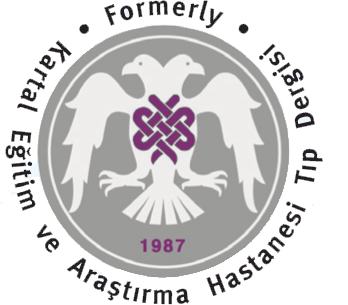Evaluation of Anxiety Status and Reasons for Refusal of Surgical Treatment Among Patients with Non-Small Cell Lung Cancer
Celal Buğra Sezen1, Celalettin İbrahim Kocatürk2, Cemal Aker1, Kemal Karapınar1, Salih Bilen1, Onur Volkan Yaran1, Seyyit İbrahim Dinçer1, Mehmet Ali Bedirhan11Department of Thoracic Surgery, Yedikule Chest Diseases and Thoracic Surgery Training and Research Hospital, İstanbul, Turkey2Department of Thoracic Surgery, İstinye University Faculty of Medicine, Liv Hospital Ulus, İstanbul, Turkey
INTRODUCTION: In this study, we evaluated reasons for treatment refusal and anxiety levels of patients who were diagnosed with non-small cell lung cancer in our hospital and were recommended surgery by a multidisciplinary committee but refused surgical treatment.
METHODS: In this study, the records of 223 patients whose cases were reviewed by the oncology council of our hospital and were recommended for surgery were reviewed retrospectively. There were patients in Group-A who accepted surgical treatment and Group-B who refused surgical treatment. The anxiety levels of all patients were assessed using the State-Trait Anxiety Inventory (STAI).
RESULTS: The anxiety levels of the patients in Group-B were significantly higher than anxiety levels of the patients in Group-A (p<0.001). Twenty-two (68.6%) of the patients in Group-B completely refused surgery, while 10 (31.3%) of the patients preferred to undergo surgery in a different center. As for the patients reasons for refusing surgical treatment, 20 patients (62.5%) reported high surgical risk, seven (21.9%) of the patients felt they had not been sufficiently informed by their doctor, and five (15.6%) of the patients reported dissatisfaction with the hospital facilities.
DISCUSSION AND CONCLUSION: In conclusion, our findings suggest that the main reason patients refuse surgical treatment is increased anxiety following diagnosis. We believe that the doctor-patient relationship is the most essential factor in patients adherence to treatment.
Keywords: Anxiety status, lung cancer; refuse treatment; surgery; thoracic surgery.
Küçük Hücreli Dışı Akciğer Kanseri Nedeniyle Operasyon Planlanan Hastaların Tedaviyi Kabul Etmeme Nedenleri ve Anksiyete Durumlarının Değerlendirilmesi
Celal Buğra Sezen1, Celalettin İbrahim Kocatürk2, Cemal Aker1, Kemal Karapınar1, Salih Bilen1, Onur Volkan Yaran1, Seyyit İbrahim Dinçer1, Mehmet Ali Bedirhan11Yedikule Göğüs Hastalıkları ve Göğüs Cerrahisi Eğitim ve Araştırma Hastanesi, Göğüs Cerrahisi Kliniği, İstanbul, Türkiye2İstinye Üniversitesi Tıp Fakültesi, Liv Hospital Ulus, Göğüs Cerrahisi Anabilim Dalı, İstanbul, Türkiye
GİRİŞ ve AMAÇ: Bu çalışmada, hastanemizde küçük hücreli dışı akciğer kanseri tanısı konulan ve multidisipliner konsey kararı ile operasyon planlanan ancak ameliyat olmayı reddeden hastaların, neden ameliyat olmak istemediklerini ve anksiyete durumlarını inceledik.
YÖNTEM ve GEREÇLER: Hastanemiz onkoloji konseyi tarafından değerlendirilerek ameliyat önerilen 223 hasta geriye dönük olarak incelendi. Grup Ada cerrahi tedaviyi kabul eden hastalar ve Grup Bde cerrahi tedaviyi reddeden hastalar yer almaktaydı. Tüm hastaların anksiyete düzeyleri State-Trait Anxiety Inventory (STAI) kullanılarak değerlendirildi.
BULGULAR: Grup Bdeki hastaların anksiyete düzeyleri Grup Aya göre anlamlı derecede yüksekti (p<0.001). Grup Bdeki hastaların 22si (%68.8) cerrahi tedaviyi hiç kabul etmezken, 10u (%31.3) başka merkez de ameliyat olmayı tercih etmişti. Cerrahi tedaviyi kabul etmeme nedenleri incelendiğinde 20 hastanın (%62.5) cerrahi riski yüksek bulması nedeniyle, yedi hastanın (%21.9) doktorun bilgilendirmesini yetersiz bulması nedeniyle, beş hastanın (%15.6) ise hastanenin imkanlarını beğenmemesi nedeniyle ameliyatı kabul etmediği bulundu.
TARTIŞMA ve SONUÇ: Sonuç olarak hastaların cerrahi tedaviyi kabul etmeme nedenleri içerisinde en önemli kısmın hastaların tanı sonrasında ruhsal olarak meydana gelen artmış anksiyete durumu olduğunu saptadık. Hasta-hekim iletişiminin ise hastaların tedaviye olan uyumdaki en önemli faktördür.
Anahtar Kelimeler: Akciğer kanseri, anksiyete durum; cerrahi; göğüs cerrahisi; tedaviyi reddetme.
Manuscript Language: English



















